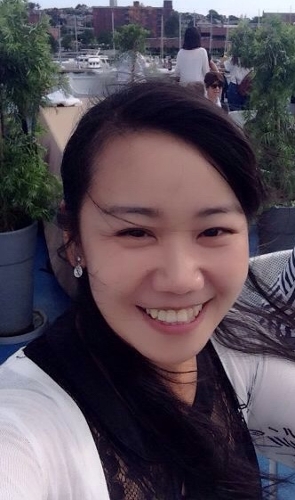 Sali Sun, MBA’17, arrived in the United States from China with one goal: to build the knowledge and relationships needed to land a full-time job in international business. What she didn’t anticipate was the number of transitions required to do so. Mastering coursework in the Brandeis International Business School MBA program imbued her with industry-focused skills – but in order to convey her qualifications, she’d need to learn the nuances of American-style networking.
Sali Sun, MBA’17, arrived in the United States from China with one goal: to build the knowledge and relationships needed to land a full-time job in international business. What she didn’t anticipate was the number of transitions required to do so. Mastering coursework in the Brandeis International Business School MBA program imbued her with industry-focused skills – but in order to convey her qualifications, she’d need to learn the nuances of American-style networking.
“I don’t know how to start small talk,” she noted at the beginning of the semester. “I don’t know how to deliver quality conversations with people that I don’t know, and being able to do so is the foundation for building business relationships.”
Enter the International Business School Global Dexterity course, taught by Andy Molinsky, a professor of international management and organizational behavior and the director of the Perlmutter Institute for Global Business Leadership. Throughout the course, Molinsky prepares students to adopt behaviors outside their cultural comfort zones that are necessary to their success, all without losing their integrity and sense of self.
“At first I perceived the class to be about understanding the behavioral differences between cultures,” said Sali. “As it turns out, it was really a semester-long self-improvement exercise in getting out of your comfort zone in any new environment.”
Molinsky’s class was instrumental in helping Sali diagnose and adjust her behaviors, though not without diligent practice. While reaching out to strangers might have felt awkward and disingenuous to her natural instincts, Sali understood that these interactions were critical in building her confidence. In small, inconsequential situations, she could practice making small talk about things such as American politics or the weather before applying her new skills to important networking encounters.
“The campus shuttle stop was a great place to practice. One time, I felt more awkward in not speaking to the only other student there,” she noted. “We started talking about the weather, which is boring to me, but the conversation eventually uncovered our shared experiences. One topic led to another so that we continued talking each morning for a number of days.”
In beating her initial fear of initiating small talk, Sali applied lessons from Molinsky’s class in refining the quality of her conversations.
“Particularly with alumni and professors, I would get lost in discussions on very serious topics. I wanted to be able to have a quality conversation, even if it wasn’t formal.”
Sali continues to build her confidence in this area, even following the conclusion of Molinsky’s class. In her final presentation, she proudly shared photos from networking events that she had successfully attended and offered stories from her journey.
“There were definitely ups and downs,” she noted. “I had a complete small-talk failure at Thanksgiving. There was a big group conversation and I hated to interrupt at any point. I hesitated to jump in but the longer I postponed participating, the fewer chances I had to contribute. It’s not a straight line of progress, but I know how I can improve next time.”
Molinsky’s class provides students with an unparalleled opportunity to refine skills that can’t be taught through cutting-edge software or textbooks (though they can be found in his books). In asking students to comb through the behaviors that may limit their professional success, he prepares them to become more agile and adaptable in a myriad of uncomfortable situations. For Sali, this was a critical turning point as she entered her final semester as an MBA student.
“We recently had a company trek to MassChallenge that I both organized and participated in,” she proudly shared. “I asked questions about their business model and operations and had great conversations with people from their operational department. I felt really prepared to make professional small talk.”
Featured Stories
News Categories
@BrandeisBusiness Instagram
View this profile on InstagramBrandeis Intl. Business School (@brandeisbusiness) • Instagram photos and videos

February 16, 2017
‘Coming Out of Your Comfort Zone:’ Erzhan Wang, MSF’17